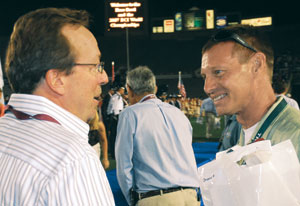Jeff Fiedler has spent his entire adult life in drum corps as a performer, instructor, and then as director of the Rosemont Cavaliers. He began his association with the Cavaliers in 1973. The organization has won seven Drum Corps International (DCI) World Championships. Fiedler has served on the DCI board for 16 years, including six years as chairman of the board. During his years in Chicago, Fiedler worked and taught at St. Francis de Sales High School. In May 2009 he accepted the new position of CEO with the Santa Clara Vanguard.
.jpg) How long does it take to develop a championship show?
How long does it take to develop a championship show?
The design team starts working on concepts a year in advance, after evaluating what works well in the current show and deciding what to emphasize for the coming year. The time from August through October is spent developing concepts for the new show. The designers will determine the complexity of the show based on the expected talent level of the performers. We then start talking about proposed music and visuals. Simultaneously, we hire technical staff and caption heads to help put the show on the field.
From the DCI championships in early August through October, a flurry of activity happens behind the scenes. There are no practices but we are sending out information to students, obtaining permission to use music for the show, and identifying areas to improve for the coming year
November through January comprises the audition season, which can include initial auditions and call-backs. We start to whittle down the numbers and determine who will be performing with us. Between January and May the brass and percussion sections meet to go through early drafts of the music. We do not use the color guard too much as this point because so many students participate in winter guard.
When does the corps start learning the show on the field?
At the end of May everyone moves in for our spring training or pre-tour period – a very intense three to four weeks. Although some students will leave for a few days to attend high school graduation or other conflicts, the pre-tour period lasts into mid-June. We rehearse up to 12 hours a day in three blocks of time each day at that point, putting together the show and determining what works in the music and effects.
Most of the show is designed well before we see it on the field, but some aspects develop later. We build the show in layers, beginning with the music and drill. Then we think about other movements or sounds that will enhance the effect. We might think about a movement or a color that would work particularly well.
When the middle of June arrives, we head out on the road and a bus seat becomes home until the end of DCI in Indianapolis. During the summer there are 25 to 30 performances in a 55-day period. The Vanguard performs every other night in a different town, 250 to 500 miles away from where you were the day before.
The days on the road pass quickly. The most difficult stretch is the period after move-in when players learn the show. By the last week before the first show, everybody wants to get on the road.
On show days we might roll into a town at 4 a.m. with everyone sleeping on the bus. Everybody will sleep for a few additional hours in a local gym before starting a three-hour morning block. There is also an afternoon block and then the performance in the evening.
How much is the show adjusted during the summer?
Tweaking goes on all through the summer. You might even have a rewrite of music or the drill. It is difficult to make changes on a show day, so most of these occur on the long rehearsal days. It helps to schedule a few days with no performances about a third of the way through the summer and again at the half-way point. These breaks allow us to assess how the show is progressing. By July and August the work involves cleaning and adjusting rather than redesigning.
How difficult it is to earn a spot in a drum corps?
The general perception is that it is really difficult. Many students see a drum corps show and doubt they could ever make it. Thankfully, we have 150 players in our organization who didn’t believe that. There are many variables that go into the audition selection process. Talent is one of them.
Most of our players are first- or second-year college students, but about 20 percent are high school students who have had better training than the average high school student. Many have taken intense private lessons and are not intimidated by the number of students auditioning.
Many players want to be in a drum corps but lack confidence or don’t know how much work is involved. This year we had three applicants for every spot. There are many high school students who check out our auditions and see what they need to improve in the next year or two. To anyone thinking about joining a drum corps I would say, you don’t have to be a superstar, but you have to work hard.
.jpg) What aspects of drum corps surprise new members the most?
What aspects of drum corps surprise new members the most?
Although our organizations are large, navigating the entire season requires considerable self-reliance. Drum corps gives students an opportunity to test their limits and see how good they can be at something. We provide organization and structure to each day, but success with 150 members requires tremendous concentration. Our players have to show a sustained willingness to work hard and improve.
What common difficulties do students encounter during the summer?
Players arrive with experiences from all types of backgrounds and for many, social skills might be the greatest initial weakness. The intensity of the work and the weeks away from home can be surprising at first. Students learn quickly that they do not have the unlimited freedom that exists at home. They cannot take out their cell phones on the football field or talk to their friends all day. There may be days when they don’t talk to anybody outside of the drum corps because there simply isn’t time.
Students play and receive instruction every day, not just on the music for the show but also a number of pocket tunes and patriotic numbers. We like to throw music in front of them that they may never perform to keep their skills up. Even though we memorize the music, it is always in their backpacks in case they have to document a phrase change or other adjustments.
Over the course of the season, students develop physical and mental endurance as they learn how to make friends and work with some really good players. They develop into stronger individuals. Occasionally we have players who have never even been in a marching band, so it takes some time to catch up. There are also so many variations in marching techniques around the country that you can never assume new members know the right way to execute certain moves with the corps’s specific method, style, or technique. With detailed instruction everyone catches on quickly.
What are your duties as CEO of the Santa Clara Vanguard?
I oversee the entire organization, which includes two drum corps, the world class Vanguard and the open-class Vanguard Cadets. These two corps have 150 and 100 members respectively. We have have a world champion winter colorguard with 21 members and six dance programs for children as young as age four through teenagers. We are considering a winter drum line in the future.
We act as a supplement to school music programs in Santa Clara County. In California there are many school budget cuts going on here and that holding true in the current difficult economy. There are some high schools in California that have no instrumental music program at all. If students cannot participate in music at a school, we provide an opportunity for them to perform.
How has the economy affected the current season?
We are very careful in scheduling our events for the summer. Our members pay a fee to participate in the Vanguard, and it is important that the cost is reasonable while still covering our activities. Many of our students travel to camps by plane or car, so careful thought goes into scheduling camps to minimize costs. Because the corps travels all summer, we are affected by changes in fuel prices.
What are the most important administrative aspects to building a strong program?
Students in any organization, whether a drum corps or a high school band, are your customers and you want them to have a good experience. You make sure that they have the best facilities and eat well. A summer with a drum corps means players will work harder than they ever have in their lives. It is incumbent upon administrators to design experiences that help students learn about themselves and how to deal with other people.
It is a big team of 150 students plus the staff, so these young adults have to learn how to coexist and learn to rely on themselves. In some ways drum corps resembles an Outward Bound experience with instruments. They are out there working, hard rain or baking heat. Surviving these obstacles shows how hard you can work. Administrators have the dual task of making the current year memorable but also thinking about where the program should go in the future.
How important is marketing and community relations to a drum corps or school program?
From a marketing perspective you have to be open to helping other organizations and teams. I assisted at Prospect High School in the Chicago area for almost 25 years and was always impressed by the strong relationships between directors and the football coach, drama teacher, and others. I also learned that if you get an opportunity to play in a parade or to tour local junior high schools, it is a cool way to give students extra chances to perform. I realized that you are always recruiting students and fans for your program.
What is the most important lesson that high school directors can learn from drum corps?
The most important lesson is to develop a strong work ethic. You have to walk in with high expectations and frequently think of creative ways to help every student learn. Younger instructors sometimes have to become more varied in their teaching ap-proaches because students will learn concepts in different ways.
Many students in the Vanguard and the Cavaliers are going to be band directors, and I advise them to maintain the same standards of excellence that they learned on the field with the corps. Certainly a drum corps might have a higher skill level and much more time to practice, but the pursuit of excellence is the same.
How has drum corps changed since you first joined the Cavaliers in 1973?
The front ensemble has been a spectacular addition for making drum corps more musical and attracting more outstanding percussionists. We did have marching xylophones in the 1970s, but there was inconsistency between organizations about whether these instruments could be used. There were even marching timpani for a while in an effort to bring that sound to the field. The front ensemble offers another dimension to the music and that is still developing. Surprisingly, the change has raised the level of musicianship, not only with the battery but also with the brass.
The addition of B-flat brass was also more significant than anyone realized at the time and opened the door to more students. Previously players had G instruments that were unfamiliar to many. When the corps went to B-flat instruments in 2000-01, an entire level of intimidation went away and more students wanted to join a corps. I actually opposed the change at first, but the benefits became obvious almost immediately through improved musicianship and more applications.
The quality of percussion instruments has also improved over the years with benefits for all types of ensembles. During the season drum corps provide a lot of research and development for percussion companies. The wear and tear on our instruments has helped companies to improve drum heads and change the shape of some instruments.
We are headed into another new area this summer with the addition of electronic instruments. Three years ago amplification was allowed for the first time and now synthesizers and other electronic instruments will be part of the mix for the first time. We are all walking a careful line to see how to add these new sounds to enhance the presentation. I expect quite a bit of trial and error.
From my perspective, it is essential that any new instruments complement the music. This year, we are performing the Ballet for Martha, the Copland piece that inspired Appalachian Spring. We are trying to add piano and synthesizer in an appropriate way that improves the program but does not dominate.
In some ways this change is as important as the addition of the front ensemble, and it might take some time to determine if the experiment is working. The drum corps folks are very mindful of their fans but also of the need to keep moving forward. In drum corps, status quo is moving backwards.





